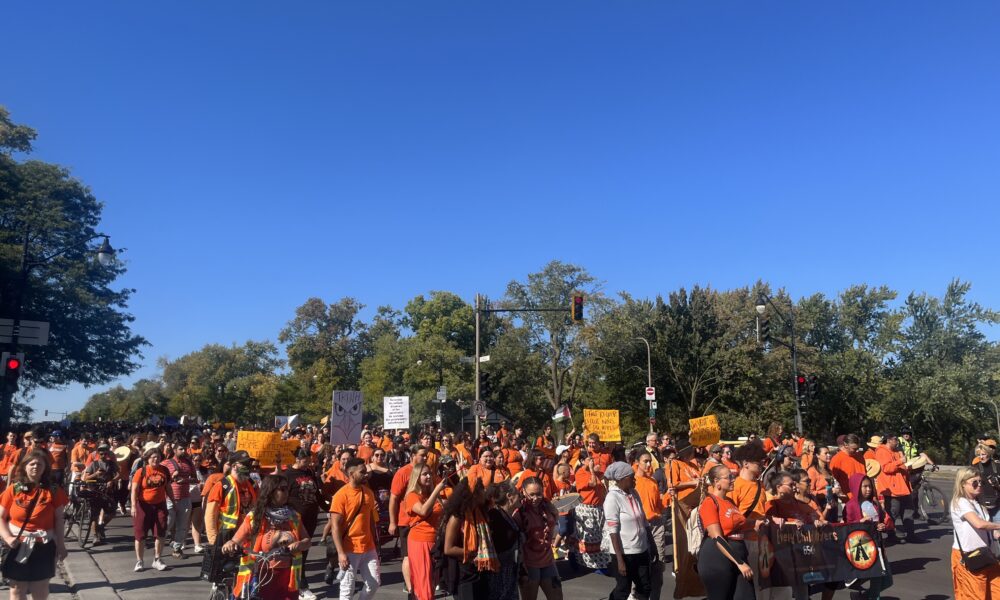Hundreds called out “Land back!” and “No justice, no peace!” at Montreal’s Every Child Matters March on Sept. 30, the National Day for Truth and Reconciliation. The rally, which began at the Sir George-Étienne Cartier Monument and ended at Place du Canada, honoured the children killed in and the survivors of Canada’s residential schools, as well as their families. The Native Women’s Shelter of Montreal and the David Suzuki Foundation organized the event with help from POP Montreal and Resource Movement.
Before beginning the walk, Nakuset, the executive director of the Native Women’s Shelter of Montreal, invited several speakers to address the crowd. Kevin Deer, a Faithkeeper at the Mohawk Trail Longhouse, led a tobacco-burning ceremony and gave the opening speech.
“We’re all gathered here to commemorate some sadness that happened in our collective history as Native people,” Deer said. “Hopefully we can write a new page and a better future, learning from the past, validating all of the hurt and the pain, understanding why this happened [….] Let’s do what our ancestors agreed [on] with your ancestors, because they said that this treaty would endure as long as the sun shines, the grass grows, and the water flows [….] We’re in the time of the Indigenous spiritual resurrection.”
After Deer’s speech, the crowd listened to a song by songcarrier, composer, and activist Jeremy Dutcher, an address from residential school survivor Noëlla Mckenzie, and drumming from the Sacred Wolf Drummers before taking to the street.
Protestors formed a sea of orange as they poured into Avenue du Parc, waving posters that read “Every Child Matters” and “Bring our children home.” Jen Jerome led call-and-response chants with a megaphone at the front of the crowd, shouting, “We are not invisible!”
As the rally approached the Roddick Gates, Jerome denounced McGill’s treatment of the Kanien’kehá:ka Kahnistensera (Mohawk Mothers), who are currently involved in an ongoing legal battle with the university over possible unmarked graves at the site of McGill’s New Vic Project. Before joining the rally, a group in support of the Mohawk Mothers held a vigil at the New Vic site to bring attention to their fight to stop construction and have a comprehensive investigation at the site.
According to the McGill Media Relations Office (MRO), archeological work at the New Vic site is being carried out according to the recommendations of the archeological panel that was jointly appointed by the Moahawk Mothers, McGill, and the Société québecoise des infrastructures (SQI). The university maintained that archeological work has been undertaken in the presence of cultural monitors, as per the settlement agreement that the Mohawk Mothers reached with McGill, the SQI, Royal Victoria Hospital, the City of Montreal, and the Attorney General of Canada.
However, Rajendra Kapila Basdeo, a coordinator for the Kahnistensera Solidarity Committee at Milton Parc Citizens’ Committee who addressed attendees at the vigil, alleged that construction has destroyed evidence of possible unmarked graves and urged the university to meet the Mothers’ demands.
“The destruction of evidence from a genocide is part of the genocide,” Kapila Basdeo said. “We demand that [McGill] stop construction until a complete and final report on the work has been approved by all parties of the settlement.”
Outside the Roddick Gates, a host of speakers, including Mohawk artist and activist Ellen Gabriel and Director of the Quebec Indigenous Mentorship Network Alex McComber, who is also an assistant professor in the Department of Family Medicine at McGill. McComber underlined that reconciliation between settlers and Indigenous communities will require work over the course of several generations.
“When [settlers] learn, they become responsible to then become changers of their nation, […]to teach their children so that their children and our children will get along better. They’ll make that new world in that good way,” McComber said.
Barbara Diabo, a Mohawk dancer who blends Pow Wow, Haudenosaunee dance, and mainstream contemporary styles, performed before the rally moved on to its final stop at Place du Canada.
In an interview with The Tribune, Cael Dixon, an Anishinaabe student at Concordia University, shared how intergenerational trauma has impacted his family and noted that events held in honour of the children impacted by the residential school system have been an important part of his family’s support system.
Indigenous storytellers and artists shared several more stories and songs and encouraged attendees to continue doing the work of reconciliation outside of the event. At around 4:30 p.m., demonstrators held onto each other and danced to the beat of a victory song performed by the Sacred Wolf Drummers, bringing the march to a close.







